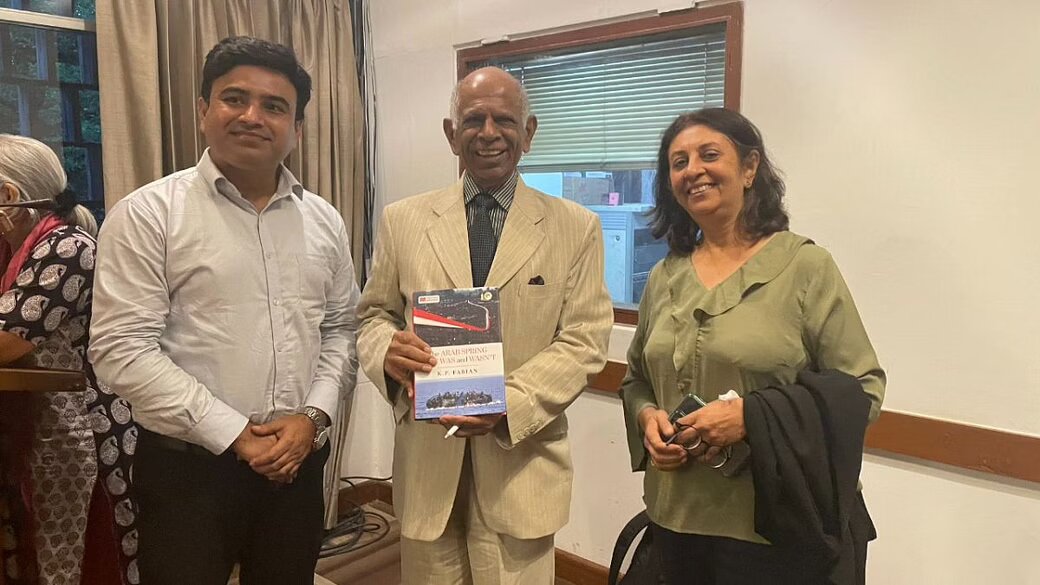Arab Spring or Islamic winter? KP Fabian’s new ‘was and wasn’t’ book answers this question
In an event in Delhi, KP Fabian discussed US involvement in the 2011 Arab uprisings and the flawed notion of resistance to democracy in Muslim nations.
Were the series of uprisings in 2011 an Arab Spring or Islamic winter? The mood of a discussion in New Delhi around K.P. Fabian’s newly launched book, The Arab Spring That Was and Wasn’t, mirrored this question.
A professor and former Indian diplomat, Fabian started writing this book after Tunisia—urged by a rebel hawker—first sprung into revolt in 2011. The Tunisian uprising had a domino effect, and anti-government protests swept through the Muslim world in what came to be called the Arab Spring.
Making a remarkable allusion, Fabian said that just like Macbeth, “the Arab Spring is also an unscripted drama which is still continuing.”
Former diplomat and high commissioner to Pakistan and Singapore, Ambassador T.C.A Raghavan and former Ambassador to Saudi Arabia Talmiz Ahmad were also present at the book launch at the India International Centre Wednesday.
Gulshan Dietl, former professor of international studies at Jawaharlal Nehru University and moderator of the discussion said that the book takes us into “the middle of the mayhem.”
Owing to the author’s experience in the region, she added, “K.P. Fabian was on the roads, watching street protests. And since he was a diplomat, he also had access to all the boardrooms and decision-making rooms.”
Calling the book “a broad bird’s eye view of the whole region,” Raghavan gave the audience a perspective that was more central to Indians. He said while a great deal is spoken about the Indo-Pacific, we never really see the wider expanse of the Indian Ocean, which includes the oft-neglected Arabian Gulf.
“To my mind, the importance of books like these is to highlight the significance of our neighbourhood because we cannot approach it in the same way,” he added.
Critiquing American involvement
Ambassador Talmiz Ahmad wove in his experiences in Saudi Arabia with Fabian’s book. “Far away from my location in Riyadh, a lot was happening in Tunisia in December 2011. For 30 years in the region, I had no concern with what was going on there. But all of that changed when, in January, Tunisia’s Ben Ali was ousted and arrived in Jeddah.”
“So, quickly, the Tunisians got rid of their problems. And the Arab Spring became my problem,” he joked.
From the rise of populism, the Iran-Saudi divide and American support of oppressive regimes, there were many consequences to the Arab Spring. However, the one thing that stood out to Ahmad was, “the erosion of US influence, credibility, and authority.”
“Cluelessness is the central feature of American involvement, sometimes for two decades in a particular region or country with no knowledge about the dynamics of that country. They were there for 20 years, and created nothing but waste and damage,” he further added.
Upholding democracy in Islamic nations
The audience raised questions about resistance to democracy in Islamic States. The idea that democracy and Islam don’t go hand in hand is one that many people have come to believe. But Fabian thinks differently.
“Western thinkers are prejudiced against Islam. There are countries like Indonesia and Malaysia which are composed of Muslims but also very democratic. What appears to be the truth is that the West has stood in the way of democracies coming into the Islamic world.”
Taking another jibe at the West, Ahmad added, “Let’s not get carried away about the Islamic faith and the Arab people. My narrative differs. Resources are essential for Western economic repair after the World Wars and economic domination thereafter. It is this resource factor which has supported Western imperialism.”
But as Dietl quoted from Fabian’s book, the social reality of the Arab world is not binary or exclusive.
This article was originally published on theprint.in
Ambassador Fabian's latest book 'The Arab Spring That Was and Wasn’t' is available on Amazon.in. You can click here to buy this book
Image courtesy: ThePrint

